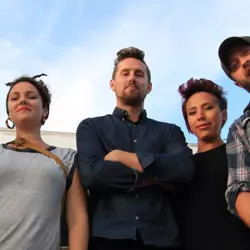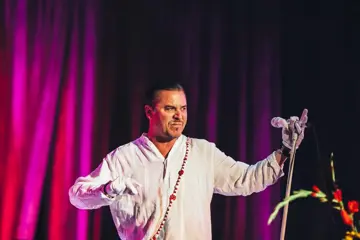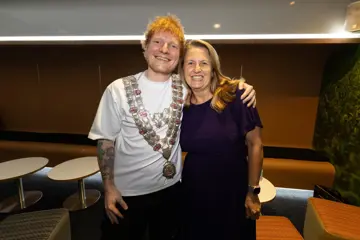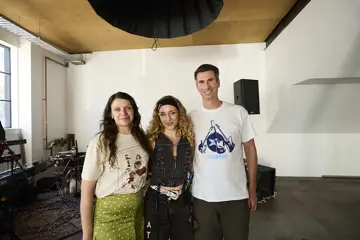 The Jerry Cans
The Jerry CansA shiver of Arctic wind carries the bark and howl of huskies through the speakers, a crisp crunch of snow underfoot melts away the summer heat from whatever stifling room you're sitting in and replaces it with vast expanses of rolling tundra. "We wanted to really make an album that transports people from wherever they are to the Arctic and we did that in Intro — we wanted to find the coldest-sounding wind you can find, which is very challenging!" laughs Andrew Morrison.
"Everyone in the band grew up in Iqaluit, Nunavutin, in the Arctic of Canada... It's an Indigenous community, the people where we live [were] formerly known as Eskimos, but we don't use that term any more because it's now considered a derogatory term... It's a beautiful spot, there's no trees, it's all rolling hills and tundra and mountains. Usually they get three hours of light in the winter, 20 hours of darkness and in the summertime there's 24 hours of light — so it's quite a different world," he enlightens.
"Usually they get three hours of light in the winter, 20 hours of darkness and in the summertime there's 24 hours of light — so it's quite a different world."
Canadian outfit The Jerry Cans are committed to preserving the language and culture of their northern roots, dispelling misrepresentations of native communities and modernising the Inuktitut tongue, traditional instruments and folk songs as a way to encourage the younger generation to embrace their ancestry. "We wanted our daughters to communicate in their own language and be proud of speaking in their own language," Morrison explains of the decision to embrace the Inuktitut dialect on their third record Inuusiq/Life. "For young people there's a lot of pressure growing up in this global world, and we wanted to tell young people they should be proud of who they are, proud of knowing their ancestral language."
"I started to learn the language because Nancy [Mike, throat singer/accordionist]'s father couldn't speak English. He had a lot of rifles and it was like, 'If you're gonna date my daughter you're gonna speak Inuktitut.' It was an extra level of motivation," he laughs heartily. The Jerry Cans pass on his story in Tusaavit (Can You Hear?): "Nancy's father was born out on the land before there was even a community. He was born in a snow house — an igloo, a very iconic symbol of the north. So he lived his life out on the land and had to provide for his family. And similar to Australia, there was a system of government schools — they took children away and made them go to school and learn English and learn a trade — and it was very traumatic for a lot of families and communities. He was very much punished, he refused to go to school and he lived a very basic life. Sometimes it's hard for young people to have any kind of understanding of what life was like back then. Sometimes I think that young people think the old ways have no value, but we wanted to switch that around and really honour the strength and endurance and ability to survive under really grave circumstances."
Don't miss a beat with our FREE daily newsletter
The group not only want to reinvigorate passion for their culture within young Indigenous fans, but also "demystify" the western idea of the north for a broader audience. "It's hard, we like to talk about these issues but we also like to tell it in a way that shows the world that we're doing something about it," he impassions. "To me, mental health and suicide is one of the big ones for young people. Everyone in our band has lost family members or old friends to suicide and I think that's just one example of an issue that's really challenging for people. And violence; within relationships, families, within communities. And that's what I wanted to remind my daughters; all these things that we need to focus on, to build on… I'm getting a bit emotional from it," he confides, "Especially with the world now, the people in power — it's dangerous. It's an especially important time to rally and find each other and remind each other that we're beautiful and strong no matter what."
Mike — the only Inuk member — is the featured throat singer on tracks such as Ukiuq, a tradition that, while "not formally outlawed, was very strongly discouraged", Morrison explains. "It was seen as backwards, and Christianity really trumped tradition. But it's gone through a very cool revitalisation over the last 20 to 25 years and that's mostly the younger female generation who are trying to bring it back. It really did almost die out because of colonisation... She's very, very good at it, she loves to do it. As a joke, I tried to mess around with Nancy with it, and I am just awful at it, like, awful," he chuckles.















